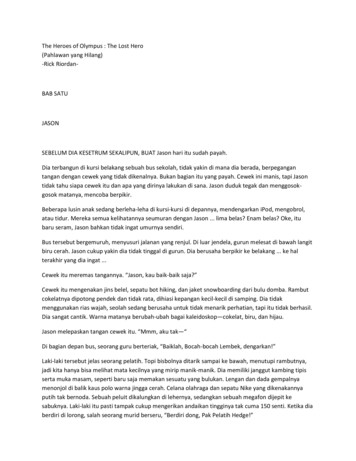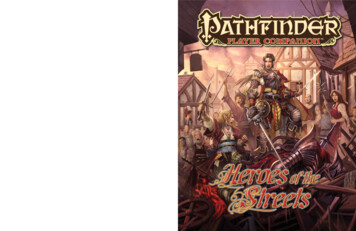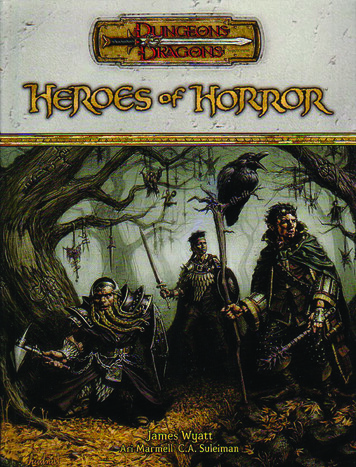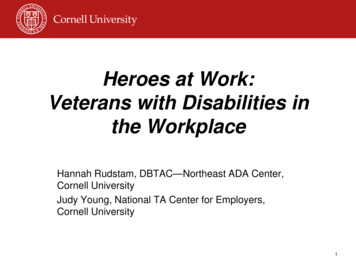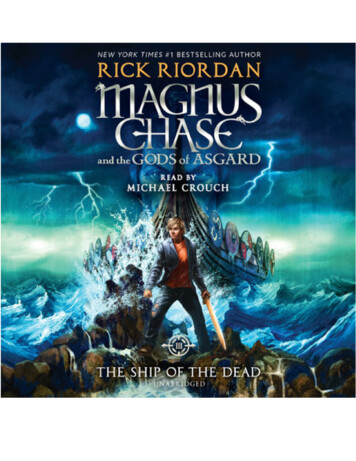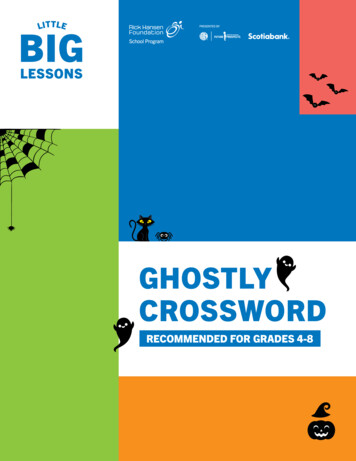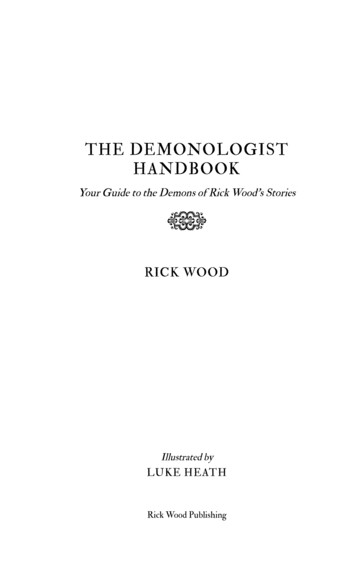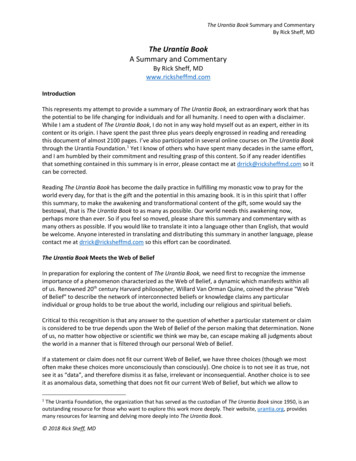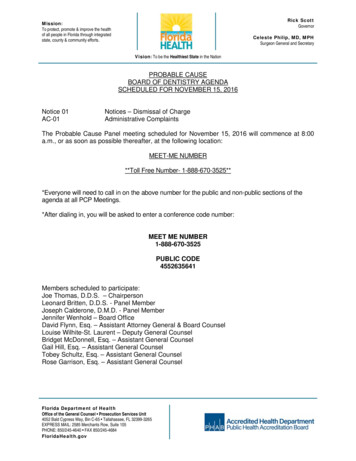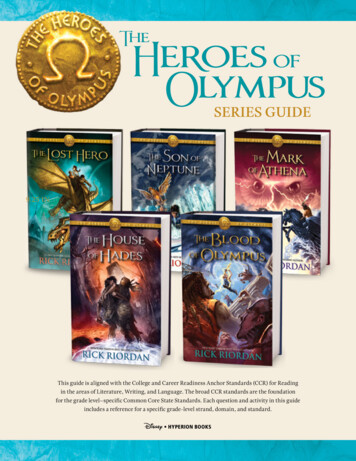
Transcription
TheHeroes ofOlympusSERIES GUIDE9.25 INThis guide is aligned with the College and Career Readiness Anchor Standards (CCR) for Readingin the areas of Literature, Writing, and Language. The broad CCR standards are the foundationfor the grade level–specific Common Core State Standards. Each question and activity in this guideincludes a reference for a specific grade-level strand, domain, and standard.Disney HYPERION BOOKSB
The Lost HeroDiscussion QuestionsThe following questions may be utilized throughout the series study asreflective writing prompts. Alternatively, they can be used as targetedquestions for class discussion and reflection.1 As the novel opens, Riordan tells us that Jason “woke in the backseatof a school bus, not sure where he was, holding hands with a girl hedidn’t know.” Predict what role Jason’s lack of understanding aboutwho he is will play in the novel.2 P iper strives to make herself blend in, though Jason describes her as a“seriously pretty.” What are some of the reasons she prefers to remain unnoticed? What do theseanswers tell us about her personality?3 T he author uses some unusual first lines to introduce the chapters. Which one is your favorite?For what reason?4 Explain the significance of being “claimed” for demigods. What is it about this tradition that providescampers at Camp Half-Blood a sense of belonging?5 L eo harbors a great deal of guilt about the death of his mother. Is he justified in doing so? Have youever felt a responsibility for events that were beyond your control? How did you work past feelingyou were to blame?6 Describe Jason, Piper, and Leo. What are three things that you find most (or least) appealing abouteach character?7 T hroughout the course of the novel, Jason learns that the world as he knows it may never be the same.In what ways will it be better or worse? Have you had an experience that reshaped your life? In whatways have you changed because of this incident?8 Predict what influence the Roman gods will have on the decisions made by Jason, Piper, and Leo.Correlates to Common Core Standard Reading Literature: Key Ideas and Details R.L. 6.2.; Speaking and Listening:Comprehension and Collaboration S.L. 6.1., 6.2., 6.3. Key Ideas and Details R.L. 7.2.; Speaking and Listening:Comprehension and Collaboration S.L. 7.1., 7.2., 7.3.2
The Son of NeptuneDiscussion QuestionsThe following questions may be utilized throughout the series study asreflective writing prompts. Alternatively, they can be used as targetedquestions for class discussion and reflection.1 A s The Lost Hero closes, Jason tells Annabeth, “Percy Jackson is atthe other camp, and he probably doesn’t remember who he is.”Predict what role Percy’s lack of understanding about who he is willplay in The Son of Neptune.2 E xplain the significance of being “claimed” for demigods. Whatis it about this tradition that provides half-bloods a sense ofbelonging? How do those who remain unclaimed deal with this condition?3 Hera’s role is an important one in The Lost Hero; predict what part she will play in The Son of Neptune.4 A t the end of The Lost Hero, campers at Camp Half-Blood learn that there is a Roman camp in Californiathat functions similarly to theirs. Why is this important? In what ways does their past rocky relationshipwith the Roman camp complicate the current issues at hand? What do they need to do to overcome it?5 F or demigods, knowing the identity of your godly parent is a critical part of building a strong sense ofself. In your opinion, why is this so important? What does a god’s choice to claim his offspring signify?6 D escribe Percy, Hazel, and Frank. What are three things that you find most (or least) appealing abouteach of them?7 C ompare Camp Half-Blood to Camp Jupiter. In what ways are these two camps similar? How are theydifferent? What lessons can these camps glean from each other? Why might the gods have chosen to givePercy and Jason the opportunity to switch camps?8 Have you had an experience that reshaped your life? In what ways have you changed due to this incident?Correlates to Common Core Standard Reading Literature: Key Ideas and Details R.L. 6.2.; Speaking and Listening:Comprehension and Collaboration S.L. 6.1., 6.2., 6.3. Key Ideas and Details R.L. 7.2.; Speaking and Listening:Comprehension and Collaboration S.L. 7.1., 7.2., 7.3.3
The Mark of AthenaDiscussion QuestionsThe following questions may be utilized throughout the series study asreflective writing prompts. Alternatively, they can be used as targetedquestions for class discussion and reflection.1 I n your opinion, what are the major similarities and differencesbetween Camp Half-Blood and Camp Jupiter? If given a choice, whichwould you choose to attend? What is it about this particular camp thatyou feel suits you best?2 I n The Mark of Athena, much attention is given to the friction betweenthe two camps. What might be the cause of their tumultuous history?3 In what ways is Frank’s lineage unique? How does he come to terms with who he is?4 W hy is it so important that Percy seek the assistance of a god to defeat Polybotes? Do you believe theoutcome would have been different without this joint endeavor? Why or why not?5 W hy is the piece of firewood that Frank keeps with him known as the fire of life, and why is it soimportant to him?6 C onsider Hazel’s past. In what ways is she different from the others? How do her past experiences shapeher character?7 W hile at Camp Jupiter, Percy is inspired by the lifestyle of others there. What does Percy ultimately hopethe future holds for him and Annabeth?8 I n The Son of Neptune, through Reyna’s leadership Camp Jupiter rallied to support Percy and defeat thegiant. Predict what role Reyna will play in The Mark of Athena.9 P ercy and Jason are the respective leaders of their two camps. In what ways are these two young mensimilar? How are they different? What type of relationship do you predict the two of them will have?10 C onsider Leo’s gifts; though he is greatly talented, he still feels isolated and alone. Why do you thinkhe feels this way? Do others see him in the same light? Why or why not?11 A t Camp Half-Blood, Mr. D is regarded as a difficult and often cantankerous god, yet in Roman lore,Bacchus is revered and celebrated. Why might these two aspects of the god be so different?Correlates to Common Core Standard Reading Literature: Key Ideas and Details R.L. 6.2.; Speaking and Listening:Comprehension and Collaboration S.L. 6.1., 6.2., 6.3. Key Ideas and Details R.L. 7.2.; Speaking and Listening:Comprehension and Collaboration S.L. 7.1., 7.2., 7.3.4
The House of HadesDiscussion QuestionsThe following questions may be utilized throughout the series study asreflective writing prompts. Alternatively, they can be used as targetedquestions for class discussion and reflection.1 T hroughout the Heroes of Olympus series, the heroes learn that whiletheir parents are gods, they are far from perfect. Consider your favoritehero and consider how his or her knowledge of his or her godly parenthas changed throughout the course of the novels. In what ways is thisrealization similar to or different from to what all kids learn abouttheir own parents?2 A nnabeth tells Percy, “You promised, Seaweed Brain. We would not get separated! Ever again!” Why doesAnnabeth fear separation so much? How are the pair stronger as a team than as individuals? Do youbelieve they bring out the best in each other? Why or why not?3 I n your opinion, what are the major similarities and differences between Camp Half-Blood and CampJupiter? If given a choice, which would you choose to attend? What is it about this particular camp thatyou feel suits you best?4 C upid laughs and states, “Oh, did you expect me to play fair? I am the god of love. I am never fair.”Considering what has transpired for the demigods, in what ways is Cupid’s statement true?5 I n the Heroes of Olympus series, much attention is given to the friction between the two camps. Whatmight be the cause of their tumultuous history?6 J ason tells Nico, “I’ve seen a lot of brave things. But what you just did? That was maybe the bravest.”Why do you think Jason feels that way? In what ways does Nico’s honesty about who he is prove howbrave he is?7 T he House 0f Hades features a number of characters who exhibit a variety of strengths. Whose strengthmost impresses you? Explain your choice.8 M ars tells his son Frank, “It’s natural to feel fear. All great warriors are afraid. Only the stupid and thedelusional are not.” Why does Mars offer these wise words to Frank?Correlates to Common Core Standard Reading Literature: Key Ideas and Details R.L. 6.2.; Speaking and Listening:Comprehension and Collaboration S.L. 6.1., 6.2., 6.3. Key Ideas and Details R.L. 7.2.; Speaking and Listening:Comprehension and Collaboration S.L. 7.1., 7.2., 7.3.5
The Blood of OlympusDiscussion QuestionsThe following questions may be utilized throughout the series study asreflective writing prompts. Alternatively, they can be used as targetedquestions for class discussion and reflection.1 C onsider the dedication in The Blood of Olympus: “To my wonderfulreaders. Sorry about that apology for that last cliffhanger. I’ll try toavoid cliffhangers in this book. Well, except for maybe a few smallones . . . because I love you guys.” What do you predict will happen inthe last book in the series?2 “ Reyna had always thought of Jason Grace as the all-American boy.Thalia looked more like the girl who robbed all American-boys at knifepoint in an alley.” In what waysdoes Reyna’s impression of the Grace siblings ring true? What about their experiences has shaped theminto the people they are?3 T he Heroes of Olympus series (and The Blood of Olympus in particular) features a number of characterswho exhibit a variety of strengths. Whose strength most impresses you? Explain your choice.4 T hroughout the series, the demigods tell the story in alternating chapters. In what ways does hearingthese diverse perspectives benefit the overall story?5 H ylla states, “No one can hate you with more intensity than someone who used to love you.” Do you agreewith this assessment? Why or why not?6 T he South Wind tells Jason, “You can’t choose your parentage. But you can choose your legacy.” Why isJason’s legacy so important to the rest of the demigods? Do you agree with this idea?7 I n many ways, the Heroes of Olympus is a story about family. Explain the significance of family to each ofthe major characters. Did you find this to be consistent throughout Riordan’s epic series?8 C onsider the differences in how the Greek and Roman camps view the gods. Do you think one camp hasa better approach than the other? Why or why not? In what ways does each camp ultimately recognize thevalue in working as a team with the other?Correlates to Common Core Standard Reading Literature: Key Ideas and Details R.L. 6.2.; Speaking and Listening:Comprehension and Collaboration S.L. 6.1., 6.2., 6.3. Key Ideas and Details R.L. 7.2.; Speaking and Listening:Comprehension and Collaboration S.L. 7.1., 7.2., 7.3.6
Across the CurriculumExtended Writing and Research Prompts1 I n the Heroes of Olympus series, readers witness all of the campers mature and grow throughout thecourse of the novels. Based on their observations, ask students which character they believe demonstratesthe greatest growth? Have students compose a short persuasive essay offering their position on this issue.While considering their selected character’s experiences, they should use textual evidence to providespecific examples to support their case. Correlates to Common Core Standard Reading Literature: Key Ideas and Details R.L. 6.2.; Speaking and Listening:Comprehension and Collaboration S.L. 6.1., 6.2., 6.3. Key Ideas and Details; Standard Writing: Research to Build andPresent Knowledge W. 6.4 and Writing: Research to Build and Present Knowledge W. 7.4.2 T he mythical creatures that colored the mythology of Greece and Rome were fearsome and fascinatingbeasts, and many are part of the lore created in the Heroes of Olympus series. Using library and Internetresources, students should consider a specific creature and conduct research to share with peers.Examples include but are not limited to Cerberus, Pegasus, the Hydra, the Minotaur, the centaurs,Charybdis, and the Harpies. Correlates to Common Core Standard Writing: Research to Build and Present Knowledge W. 6.4 and Writing:Research to Build and Present Knowledge W. 7.4.3 I n addition to a wide variety of inventions and global contributions, ancient Greeks and Romans excelledat applied mathematics. As a class, consider the Pythagorean theorem, Euclidean geometry, and otherapplications in engineering and physics. Using library and Internetresources, students should consider other ways that the ancient Greeksand Romans contributed to the discipline of mathematics. Havestudents select one of the following to research: Pythagoras,Euclid, Archimedes, or Hypatia of Alexandria. Next, askthem to consider the following: How did this individualcontribute to our understanding of mathematics during thistime period? How did these advances serve the Greek andRoman people, and in what ways have mathematical practicesbeen influenced by these contributions? Have studentsprepare a report of their findings. Correlates to Common Core Standard Writing: Researchto Build and Present Knowledge W. 6.4 and Writing:Research to Build and Present Knowledge W. 7.4.Dionysus/Bacchus7
4 P art of the legacy of ancient Greece and Rome are the monuments these societies erected. In additionto the great monuments of Greece and Rome (the Parthenon, the Erechtheion, the Pantheon, andthe Colosseum, for example), monuments that pay tribute to ancient Greece and Rome can be foundthroughout the world. Have students research a Greek or Roman monument or one inspired by theGreco-Roman styles referenced in the Heroes of Olympus series and consider the following: What was the purpose of that style and why did civilizations beyond the Greeks and Romans chooseto use it? W hen considering one of the genuine Greek and Roman artifacts throughout the world, why and howwas the artifact placed in its current location? W hat conservation efforts are being made to protect this artifact? Using Animoto or another digitalmovie maker, make a video of your research findings to share with the class. Correlates to Common Core Standard Writing: Research to Build and Present Knowledge W. 6.4 and Writing:Research to Build and Present Knowledge W. 7.4.Classical VocabularyIf vocabulary lessons coincide with your reading of the Heroes of Olympus books, consider this extension.Develop the lesson into a study of Greek and Latin roots and have students learn both translations for theirvocabulary terms (terms will, of course, need to have a Greek or Latin root, or both): Assign students to learn Greek and Latin terms both phonetically and in their respective alphabets. Usethe opportunity to investigate or discuss transitions in alphabets from ancient Greek to modern English. Have student pairs or trios investigate the philology of an assigned term—that is, the evolution of themeaning of that term through history. Each group should present their findings for the rest of the class. To carry the extension further, assign students to learn phrases or clichés that employ either a vocabularyterm of their choice or one you assign in Greek or Latin. These may be part of a Greek or Latin saying, orone that’s been translated into Greek or Latin. Encourage them to investigate books or sites that collectfamous quotes, lines from literature or poetry, and the like.8
Exploring Through Extension ActivitiesIn the Heroes of Olympus series, the complexities of the Greek and Roman deities, their relationships,and the situations in which they find themselves provide students opportunity to dig deep into the Greekand Roman myths as they examine and answer one of the following prompts: Though the stories of the major players in the Heroes of Olympus were created in ancient Greece andancient Rome, if these characters lived in our time, they would likely use the same social media that ispopular in our world. Select a Greek god or goddess of your choice and create a faux Facebook page forthat character, being sure to complete all the pertinent information, like education, relationships,groups to follow, pages to like, and two to three status updates. Throughout the course of the Heroes of Olympus series, readers are offered great insights about theGreek and Roman gods encountered by the demigods. Assume the role of one of the gods or goddessesand compose a diary entry detailing what you experienced and witnessed. To prepare, create an outlineusing the five Ws (who, what, when, where, and why). Remember to write in first person and give specialattention to sensory imagery (what you saw, smelled, heard, etc.). Consider the gods and goddesses featured in the Heroes of Olympus. What characteristics do thesedeities have in common? In what ways are their personalities and the challenges they face similar tothose of people today? Based on what you’ve learned, which of the gods or goddesses do you think youare most like? Create a Venn diagram comparing and contrasting yourself with the Greek god orgoddess of your choice. In small groups, have students select a favorite scene from a Heroes of Olympus book and createeither a digitally or manually illustrated graphic novel for that scene. A digital comic strip creator(makebeliefscomix.com or infinitecomic.com, for example, can help them create storyboards for theirselected myth. Have students select original art, images, and graphics. Alternatively, students couldassume the roles of two of the characters with each one’s personality and voice and have them interactwith one another by creating an extension of a scene from the myth. As part of the evaluation component,consider panel size and number of panels, transitions and layouts, artwork, writing, and lettering. Ask students to draft a short essay answering the question “Should mortals be allowed on MountOlympus?” This notable topic was never settled in ancient Greece. It is up to your students to resolve theissue by developing a persuasive argumentative essay that inserts the role of “hero” into the discussion.Have students select their favorite Greek or Roman god or goddess featured in the Heroes of Olympusseries— or from additional studies on Greek and Roman mythology —and then choose one of theseassignments for practice in letter writing (in both print format and e-mail): Your favorite mythological character has just retired, and Zeus/Jupiter, the father of the gods, isnow accepting applications for a replacement. Write a letter of application and a brief resume orbiographical sketch. As the best friend of a mythological character, write a letter offering support, encouragement, orguidance for a task or quest your friend hopes to accomplish. Be sure to research the differencesbetween formal and informal letters or e-mails.9
One of the hallmarks of Greek and Roman myths was how they were often used to explain naturalphenomena. Challenge your students to create an original myth to explain some natural phenomenon orland formation—anything from the origin of hurricanes to how a mountain range was created. They shouldchoose Greek or Roman gods and goddesses from the Heroes of Olympus books and use the following pointsto guide the creation of their myth: The story must involve at least two gods or goddesses, but is not limited to just these two. The original myth must explain a natural phenomenon or a geological feature (a sea, a polar ice cap,a mountain range, etc.). The story should include details about the Greek or Roman gods and goddesses you’ve discoveredthrough reading the Heroes of Olympus. It should show your understanding of their powers, symbols,and personalities.Correlates to Common Core Standard Reading Literature: Key Ideas and Details C.C.S.S.E.L.A. Literacy. R. L. 4.1.,4.2.,4.3, R.L. 5.1.,5.2., 5.3. Integration of Knowledge and Ideas. C.C.S.S.E.L.A. Literacy. R. L. 4.7.,4.9. R. L. 5.7.,5.9.R. L. 6.7.,6.9.Aphrodite/Venus10
Utilizing the Heroes of Olympus for Language DiscoveryGreek and Roman mythology’s influence is evident in our daily language. It’s difficult to imagine readingor writing without drawing upon myth-oriented adjectives or idioms. As part of your everyday curriculumor as part of a separate word-study unit, ask students to research the histories of words and phrases thatcome from the Greek and Roman myths. For instance, ask them what it means to have an “Achilles’ heel.” Toprovide clarity, share the myth with them or allow them to research Achilles’s story on their own. Then askthem to speculate on the meaning of the following modern-day expressions and determine their Greek andRoman mythological connection: l abyrinth atlasH erculean effortM idas touch panic tantalize titanic Pair students up and challenge them to find as many Greek or Roman myth language connections as theycan. To extend the activity, have them use the collected words in a myth of their creation.Great Greek and Roman GirlsWomen usually weren’t afforded the same respect as their male counterparts in the Greco-Romanworld, they certainly contributed heavily to its greatness! Since Rick Riordan writes about strong femalecharacters, including Athena, perhaps the greatest of the female deities of Olympus, have students researchsome of the great female figures—mortal, immortal, and in between—of the classical Mediterranean world.Pair or group students and instruct them to investigate one of the subjects suggested below (or their owncomparable choice). Then have them present their findings to the class. Parameters for research mightinclude the following: Provide a brief bio of the subject, but emphasize some of the lesser-known attributes. Assess the “defining elements” of the subject—how did this figure help define women in the GrecoRoman World? How did that world help define what made your subject significant? How does she helpus define their era now? Make a “today’s version” argument—who best embodies the strengths, weaknesses, and significanceof your subject in today’s world? Suggested subjects: Athena Hypatia Penelope the Amazons Ariadne the Pythia Hortensia Fortuna Cleopatra Dido11
Beast of a MythologyThe great beasts of Greco-Roman mythology helped the people of the classical Mediterranean explain theoddities and mysteries of the natural world—and also added plenty of suspense and excitement to the mythsthemselves! Assign student pairs or groups to investigate some of the beasts of Mediterranean mythology,the bullet points are for the students, while the instructions are for the teacher: Provide the origin story and characteristics of the creature. Emphasize the “why”—the characteristicsof these beasts are closely related to their origins, their creators, and some problem or tension (usuallyhuman) at the time. Also address why the creature manifested in the form that it did. How might itssetting or purpose have dictated its existence in its particular form rather than another? Explain how the belief in the existence of these creatures may have affected the behaviors or thoughts ofGreeks and Romans of the ancient world. Provide a depiction of the creature, both in mythical and natural terms. In other words, are there naturalphenomena that could have been misunderstood as a particular beast? In the case of creatures that don’tsignificantly differ from natural parallels, how were they made to be more fearsome? What was the basisfor the fear they struck in people? For instance, consider that dragons were considered lucky in ancientEast Asia, but similar serpentine creatures were loathsome in the ancient Mediterranean. Possible subjects: the Python Cerberus Pegasus the Hydra the Minotaur centaurs Charybdis Cacus fauns the Harpies the Cyclopes the Cretan bull Nemean lion Arachne Artemis’s boar Athena’s owl Jason’s ramArachne12
These Myths Are Mixed Up!The following seven statements are taken from famous (and some not-so-famous) Greek and Romanmyth, but each has three major errors in it. See how well your students know their myths—can they fixthese mix-ups? (We gave you the right answers.)1 Although Hermes persuaded Poseidon to release Aphrodite’s daughter from the Underworld, youngPersephone ate the seeds of the pomegranate, which caused her to be turned into a tree. ANSWER: Although Hermes persuaded Hades to release Demeter’s daughter from the Underworld,young Persephone ate the seeds of the pomegranate, which caused her to spend a third of the yearin the Underworld.2 As punishment for providing humans with fire, the god Hephaestus was banished by Zeus to the prisoncave of Poseidon, where he was forced to battle Ceto. ANSWER: As punishment for providing humans with fire, the Titan Prometheus was bound by Zeus toa rock in the Caucasus, where a giant eagle ate his liver every day.3 Orion was laid to rest among the stars after being accidentally killed by his beloved Aphrodite, who wastricked by the jealous god of war, Ares. ANSWER: Orion was laid to rest among the stars after being accidentally killed by his admirer Artemis,who was tricked by her protective brother, Apollo.4 Juno was so jealous of the beauty of Psyche that she ordered Pluto to punish her, but Pluto kept her safelyhidden until she looked upon his face and was pulled back into the Underworld. ANSWER: Venus was so jealous of the beauty of Psyche that she ordered Cupid to punish her, but Cupidkept her safely hidden until she looked upon his face and he disappeared in a puff of smoke.5 Daedalus tamed the flying stallion Pegasus to carry him and his son Oedipus from the tower of Minoanking Minos, but Oedipus was killed when he pushed Pegasus to fly too close to the constellation Scorpio. ANSWER: Daedalus crafted wings to carry him and his son Icarus from the tower of King Minos, butIcarus drowned when he flew too close to the sun and the wax holding the wings’ feathers melted.6 King Midas’s gift of the Golden Touch, granted by Apollo, was only taken away when the god told Midasto bathe in the River Styx and he was taken into the Underworld by Hades. ANSWER: King Midas’s gift of the Golden Touch, granted by the god Bacchus, was only taken away whenthe god told Midas to bathe in the River Pactolus, whose sands were made golden.7 Romulus and Romanus, brothers and founders of Rome, burst from the skull of their father after hedevoured them, fearing treachery. They fled to be raised by a bull. ANSWER: Romulus and Remus, brothers and founders of Rome, were condemned to die in the RiverTiber by their great-uncle, but were found and cared for by a she-wolf.13
Map Your Way through History!Locate the following historically significant places on a map of the classical world, and match them to theevent or significance of that location.GREEK WORLD Crete/Knossos (earliest Greek civilization, the labyrinth of King Minos) Mycenae (kingdom of Agamemnon, leader of the expedition to Troy) Troy (in Anatolia, location of the Trojan Wars in the Iliad) Athens and Sparta (most powerful city-states of the classical era) Delphi (site of the Temple of Phoebus Apollo, home of the Oracle) Mount Olympus (home of the gods) Olympia (site of the Temple of Zeus—one of the ancient wonders of the world—and home of theancient Olympic Games) Marathon (site of the Athenian victory over the Persians, followed by the famed run of Phidippidesto carry the news to Athens) Thermopylae (site of the stand of over three hundred Spartans against tens of thousands ofPersian invaders) Alexandria (in Egypt; built by Alexander the Great, center of commerce and knowledge in theMediterranean until the Roman conquest)14
ROMAN WORLD Rome (capital city of the Republic and the Empire until the fourth century AD) Etruria (modern Tuscany; kingdom of one of Rome’s parent civilizations, the Etruscans) Sicily (center of the Mediterranean world, site of Greek colonization and spread of Greek culture to Italy) Carthage (in modern Tunisia; Rome’s greatest rival) Ostia (port for the city of Rome—no longer exists, but was second only to Rome itself in its day) Cannae (site of Hannibal’s victory over the Roman legions, though it ultimately cost him the war) Mount Vesuvius, Pompeii, and Herculaneum (resort cities on the Gulf of Naples, destroyed byvolcanic eruption) Lugdunum and Lutetia (modern Lyon and Paris; key trade centers in Gaul) Londinium (modern London; northernmost city in the Roman Empire) Hadrian’s wall (boundary between Roman Britannia and Scotland) Byzantium (ancient Greek city, became the site of the new eastern Roman capital of Constantinoplein the fourth century AD) Ravenna (major trade center, became the center of the revival of Roman and Christian traditionsafter the Roman Empire’s collapse)Some Gods Are Underdogs!Put students into mixed-ability pairs and havethem research and develop a biographicalpresentation of a lesser-known deity fromthe Greco-Roman tradition. These may includedeities that either are rather obscure or simplywere not studied in class.Possibilities might include: Nemesis Salacia Concordia Pan Fortuna Alecto Pax Hecate Juventas Nemesis15
The Ultimate MotherGaia has a pretty bad rep in the Heroes of Olympus series. Are these statements about the Earth Mother’splace in Greco-Roman mythology FACT or FICTION? Gaia was born of sea foam and drops of blood from her father, Uranus. FICTION (This describes the birth of Aphrodite, the giants, and the nymphs. Gaia was born out of the primordialvoid the Greeks called Chaos.) Our popular perception of a tolerant, generous, fr
The House of Hades Discussion Questions The following questions may be utilized throughout the series study as reflective writing prompts. Alternatively, they can be used as targeted questions for class discussion and reflection. 1 Throughout the Heroes of Olympus series, the heroes learn
